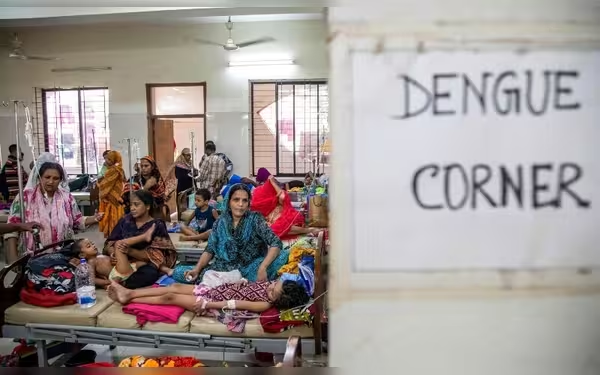Saturday, November 16, 2024 07:51 PM
Dengue Fever Surge in Bangladesh Raises Alarm Among Health Experts
- Over 65,000 dengue cases reported in Bangladesh.
- Aedes mosquito thrives in stagnant water.
- Immediate action needed to control mosquito breeding.
 Image Credits: dawn.com
Image Credits: dawn.comDengue fever cases in Bangladesh exceed 65,000, raising concerns among health experts about mosquito breeding and public health.
Dengue fever, a viral infection transmitted by the Aedes mosquito, has become a significant health concern in Bangladesh. This mosquito, easily recognized by its black and white striped legs, thrives in stagnant water, making it a common sight in urban areas where water collects. As the monsoon season comes to an end, one would typically expect a decrease in dengue cases. However, this year has been different, with over 65,000 cases reported by the beginning of November.
The rise in dengue cases is alarming for medical professionals and the general public alike. The Aedes mosquito breeds in places where water accumulates, such as flower pots, discarded tires, and clogged drains. This means that even small amounts of standing water can lead to a surge in mosquito populations. As the rainy season recedes, many might think the threat diminishes, but the reality is that the conditions for breeding can persist, leading to continued transmission of the virus.
Health experts are particularly worried about the impact of dengue fever on vulnerable populations, including children and the elderly. Symptoms of dengue can range from mild fever to severe illness, and in some cases, it can even be fatal. The situation calls for immediate action from both the government and the community to control mosquito breeding sites and raise awareness about prevention methods.
Preventive measures are crucial in combating the spread of dengue. Communities are encouraged to eliminate standing water around their homes and workplaces. Simple actions, such as regularly cleaning gutters, covering water storage containers, and disposing of trash properly, can significantly reduce mosquito breeding sites. Additionally, using mosquito repellents and wearing protective clothing can help individuals avoid bites.
As the situation unfolds, it is essential for everyone to stay informed and take proactive steps to protect themselves and their families. The fight against dengue fever requires a collective effort, and by working together, communities can help reduce the number of cases and safeguard public health. Remember, prevention is always better than cure, and a little vigilance can go a long way in keeping dengue at bay.













